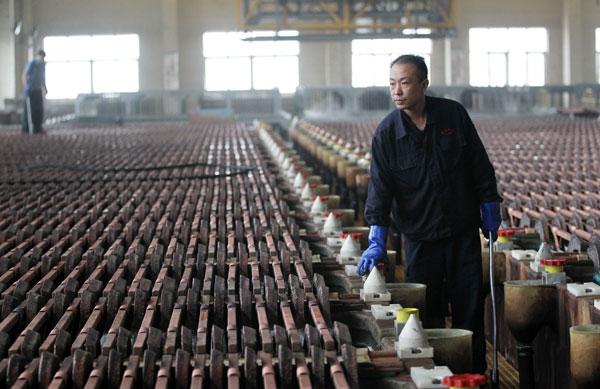 |
|
A worker surveys blocks of copper at the factory of Baiyin Nonferrous Metals Co in Baiyin, Gansu province. [Photo by Zhang Wei / China Daily] |
Moves are underway to reduce emissions and pollutions in the heartland of China's metals and petrochemical industries, as Yang Wanli and Xue Chaohua report from Baiyin, Gansu province.
If you mention air pollution in Baiyin, the locals are always happy to relate a famous local story. In the 1990s, a man spent his entire month's salary on a Phoenix bike, one of the most popular brands in China at the time. After riding his new pride and joy to work, the man locked his bike and left it outside the factory. A little later, a rainstorm hit the area. At the end of his shift, when the man went to fetch his new bike, he was unable to find it because the high acid content in the rain had dissolved the paint on the frame, leaving his new bike looking as pitted and worn as all the others in the rack.
"It's a true story. From the 1960s until the early part of this century, the entire city was shrouded in a choking acid mist. People even stopped smoking, not because of health concerns, but because the acid in the air made the cigarettes taste too sweet," said Zhao Zhanjiang, 67, who worked for Baiyin Nonferrous Metals Co from 1971 until he retired in 1998.
Things have yet to improve significantly. This year, Baiyin was listed as one of the five worst cities in Gansu province for air quality and the other four - the provincial capital of Lanzhou, plus Jinchang, Jiayuguan and Tianshui - were all firmly rooted at the lower end of a nationwide list of 74 surveyed by the Ministry of Environmental Protection.
Particle pollution, also called particulate matter or PM, is the term used for a mixture of solid particles and droplets of liquid found in the air. Particle pollution includes "inhalable coarse particles," those larger than 2.5 micrometers - known as PM 2.5 - and smaller than 10 micrometers, known as PM 10.
In 2011, the World Health Organization reported that Lanzhou had the worst air quality among 11 cities in western China. The city's PM 10 reading of 121 meant the air quality was even worse than in Beijing.
The residents of Baiyin are no strangers to poor air quality. Records collated by the Baiyin Environment Protection Bureau show that in 2004, the city experienced just 152 "blue-sky" days, the lowest number in the city's history. In Lanzhou, the record of 235 days was set in 2009, making it the worst offender among the 74 major cities under ministry supervision.
However, things began to change in 2012 when Lanzhou failed to appear in a list released by the ministry that showed the 10 cities with the worst air quality. In a surprise about-face, in September Lanzhou was ranked sixth out of the top 10 cities with the best air quality. Lanzhou and Lhasa, the capital of the Tibet autonomous region, were the only inland cities on the list, the other eight were all situated in coastal areas. In October, Lanzhou's air quality was ranked 23rd nationwide, the best placing of any city in the northwest.
|
|
|
|
|
|
|
|
